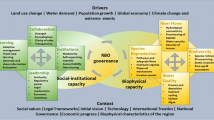Abstract
This article focuses on the problems of water governance at a river basin level, and on the role of institutional coordination, participation and partnerships between multiple stakeholders towards sustainable water management. Its approach presupposes that institutional capacity building, strengthening coordination between government institutions (vertical and horizontal), on the one hand, and broadening participation and consolidating partnerships between public, private and civil society actors, on the other hand, is among effective tools in integrated water resource management in river basins. It explores environmental challenges, problems, emerging trends and recent institutional innovations in the Volga basin in Russia—the largest river basin in Europe. Transfer and adaptation of good practices in good water governance between the EU and Russia are discussed. This article presents some research findings and lessons learned from practice by the EC international project ‘CABRI—Cooperation along a big river: Institutional coordination among stakeholders for environmental risk management in the Volga basin’, which is assessed as one of the selected success stories of the European research.’

Similar content being viewed by others
References
Comor E (2001) The role of communication in global civil society: forces, processes, prospects. Int Stud Quarterly 45:389–408
Conca K (2006) Governing water. Contentious transnational politics and global institutional building. MIT Press, Cambridge, Mass-London, England
Cowie G, O’Toole L (1998) Linking stakeholder participation and environmental decision-making. Assessing decision quality for interstate river basin management. Academic Publishers, Dordrecht, Kluwer
Environmental OECD outlook to 2030 (2008) Paris, OECD Publishing
Gerlak A (2004) One basin at a time: the global environmental facility and governance of transboundary waters. Global Environmental Politics 4(4):108–141
Komarov I (ed) (1996) Revival of Volga. A step towards saving Russia. Ekologia, Moscow-Nizhny Novgorod (in Russian)
Kotov V, Nikitina E (2001) Mechanisms of environmental security in Russia: out of order? In: Petzold-Bradley E, Carius A, Vincze A (eds) Responding to environmental conflicts: implications for theory and practice. Kluwer Academic Publishers, London
Kotov V, Nikitina E (2002) Reorganisation of environmental policy in Russia: the decade of success and failures in implementation and perspective quests. Nota Di Lavorno, 57
Naidenko V (2003) Great Volga at the frontier of millennium. From environmental crisis to sustainable development. Vol 1 and vol 2. Promgrafika, N.Novgorod (in Russian)
Nikitina E (2006) Success and failures in flood risk reduction programmes across Asia: some lessons learned. Special issue on flood disaster risk reduction. Sci Cult 72:1–2
Nikitina E (2007) Environment. In: Russia and the world. Economy and International Policy. Annual Forecast 2008. Moscow, Trade Chamber—IMEMO (in Russian)
Osipov V (ed) (2001) Natural threats in Russia. Hydrometeorological Threats, Kruk, Moscow (in Russian)
Ostrovskaya EV, Kurapov AA, Neginskaya RV, Popova NV, Rabkina EV (2006) Assessment of environmental risks of oil operations in the Caspian Sea. J. Environ prot oil gas ind, No 11 (in Russian)
Ottaway M (2001) Corporatism goes global. Glob Governance 7(3)
Pinder J, Shishkov Y (2002) The EU and Russia. The promise of partnership. The Federal Trust, London
Research for Europe—a selection of EU success stories (2008) EC, Luxembourg, ISBN-978-92-79-06980-2, pp 102–103
State report on protection of population and territories of the Russian federation from natural and technological disasters in 2004, Moscow, EMERCOM (in Russina)
Statistical yearbook of the Russian federation 2006 (2007) Goskomstat, Moscow
The Volga vision UNESCO’s interdisciplinary initiative for sustainable development of the Volga-Caspian basin (2004) Paris, UNESCO
Vodny Kodeks Rossiiskoy Federacii [Water code of the Russian federation], (2006) N 74-ФЗ
White GF (1998) Reflections on the 50-year international search for integrated water management. Water Policy 1(1):21–27. doi:10.1016/S1366-7017(98)00003-8
Acknowledgments
We acknowledge the support of the EC/INCO, Contract No 013424, 2004-2007, and of the APN, Asia-Pacific Network for Global Change Research, Contract ARCP2008-15NMY-Nikitina.
Author information
Authors and Affiliations
Corresponding author
Rights and permissions
About this article
Cite this article
Nikitina, E., Ostrovskaya, E. & Fomenko, M. Towards better water governance in river basins: some lessons learned from the Volga. Reg Environ Change 10, 285–297 (2010). https://doi.org/10.1007/s10113-009-0092-x
Received:
Accepted:
Published:
Issue Date:
DOI: https://doi.org/10.1007/s10113-009-0092-x




